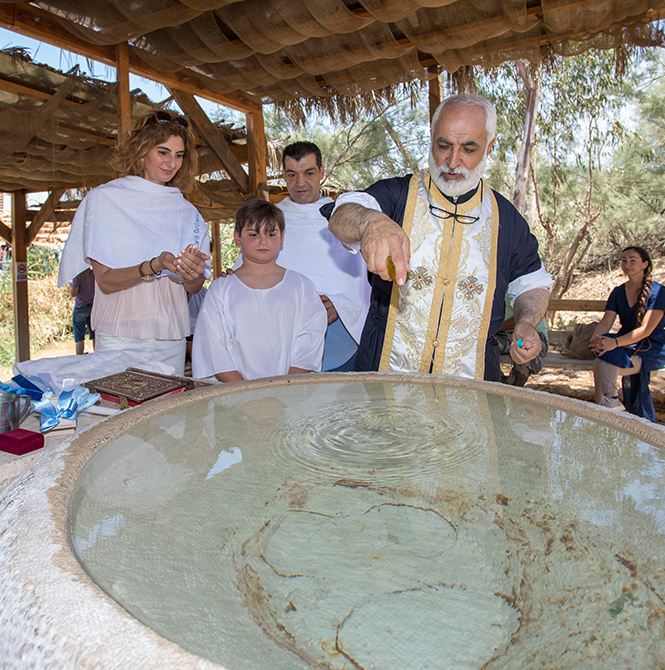
The custodianship of Muslim and Christian sanctities reflects the historical relationship between Muslims and Christians which is based on mutual respect and protection for their sanctities in peace and harmony. It is a unique historical and religious advantage for a Hashemite king to preserve Christians' rights to their sanctuaries. His Majesty King Abdullah II's guardianship of Christian sacraments is of legal and historical importance to some 2.4 billion Christians worldwide. It is also an integral part of the continuation of the Islamic duty to protect and sustain Christian sanctities in Jerusalem, and to protect the principles of common living among adherents of both religions. Thus, custody of Christian sanctities is equally important for 1.9 billion Muslims worldwide.


Christian sanctuaries in Jerusalem are dimensions; The first is administrative, governed by the principle of Status quo (status quo) in force since the Ottoman era, whereby Christian sacraments are supervised and administered within the competence and prerogatives of Christian churches, with the exception of the Orthodox Patriarchate. The other dimension is a national dimension, both those of Jerusalem and the occupied West Bank; For Jordan and its Hashemite leadership, it is a privileged national issue.
History of the Hashemite Custodianship of Jerusalem
Responsibility for endowments and sanctities in Jerusalem is a sacred responsibility that Jordan has carried since 1924 out of a sense of responsibility towards Islamic sanctities in Palestine. Haj Amin al-Husseini, head of the Supreme Islamic Council, had asked the founding King Abdullah I Ibn al-Hussein on August 30, 1924 that the entire building of the Temple Mount be under his auspices, and the Hashemite care of the holy sites in the city of Jerusalem has continued to this day.
When the administrative and legal link with the West Bank was disengaged in favor of the Palestine Liberation Organization in 1988, it did not include endowments and sanctities; In the interest of Jordan to preserve, serve and maintain it, and at the request of the Palestinian side as well. After King Hussein's decision to disengage from the West Bank, a delegation of Christian notables met with His Majesty and demanded that he continue his custodianship over the churches in Jerusalem, and that they be excluded from the decision to disengage.
Also, the terms of the Wadi Araba Treaty (the peace treaty between Jordan and Israel), signed on December 26, 1994, stated Jordan's responsibility towards endowments and sanctities in the city of Jerusalem, and indicated that when the final status negotiations between Palestine and Israel were held, the latter would give great priority to the Jordanian role history in these places.
Although the talk often referred to responsibility in Islamic endowments, the Jordanian guardianship extends to Christian endowments, as evidenced by the continued validity of Jordanian Law No. 27 of 1958. On August 13, 1994, the late King Hussein bin Talal wrote to the Patriarch of the Holy City of Rome The Orthodox Theodore I, stressing the importance of the Hashemite role in the sanctuaries, said: “Here we would like to stress that the Jordanian Hashemite role in caring for the Islamic and Christian holy places in Jerusalem will continue, God willing.” And King Hussein is the same who, while welcoming Pope Paul VI on January 4, 1964, described himself as “the protector of the holy places.”
Reaffirming the Custodianship, in 2013:
His Majesty King Abdullah II and Palestinian President Mahmoud Abbas signed in Amman, on March 31, 2013, a historic agreement, in which the Palestinian president reaffirmed that the King is the custodian of the holy places in Jerusalem, and has the right to make all legal efforts to preserve them, especially Temple Mount (Al-Aqsa Mosque), defined in the agreement as the entire Temple Mount.
In its preamble, the agreement states that King Abdullah II is “the custodian and servant of the holy places in Jerusalem,” while President Abbas is the president of the State of Palestine, the head of the Palestine Liberation Organization, and the president of the Palestinian National Authority. What is new in the agreement is also the talk about Christian sanctities, including the Greek Orthodox Patriarchate of Jerusalem, which is subject to Jordanian Law No. 27 of 1958. The agreement also indicates that the 1988 disengagement decision excluded the holy places in Jerusalem from the disengagement.
As for the Holy See, the Vatican, its firm position on Jerusalem was confirmed following the meeting of His Majesty King Abdullah II in the Vatican with His Holiness Pope Francis on December 18, 2017, where the official statement affirmed that Jerusalem is a unique and holy city for followers of the three religions. His Holiness called, during the meeting, to respect the status quo in Jerusalem, in line with relevant United Nations resolutions, and in a way that contributes to avoiding more violence and tension. His Holiness also referred to the pivotal role of His Majesty King Abdullah II in protecting the holy places in Jerusalem, praising Jordan's commitment to achieving peace and stability in the region and the world.
The Importance of Custodianship of the Christian Sanctuaries in Jerusalem
The Hashemite custodianship of Christian Sanctuaries is important for the following reasons:
1. Because it represents the continuity of the existing historical situation that included all the churches of Jerusalem, those that existed before the Umar period, 1400 years ago, and those that followed them in later centuries, in terms of official sultan or royal approval.
2. The Hashemite custodianship guarantees the rights of churches in their sanctities, and protects and supports the rights of all churches in the Holy Land. Under Islamic law, Christians have an inviolable right to worship in their churches, and the Hashemite guardianship preserves and guarantees these rights.
3. The guardian protects the Christian legal status in Jerusalem, as the guardianship preserves the laws under which the churches operate, including the election of patriarchs.
4. The guardian protects and maintains ecclesiastical courts, where Christians define and enforce their own laws relating to personal status, marriage, divorce, and inheritance, and are excluded from Islamic law. This arrangement, unique of its kind, grants Christians religious and cultural autonomy to preserve their Christian identity. This arrangement is also applied in the Hashemite Kingdom of Jordan.
5. The guardian protects and supports the Christian churches, which is the source of official recognition for the churches, and allows them to write their school religious curricula in public and private schools. This unique procedure preserves the future of Christian identity, and is also applied in the Hashemite Kingdom of Jordan.
6. His Majesty supports the heads of churches by granting them Jordanian passports, donations and official accreditation. The Patriarchs and Archbishops in Jerusalem practice their work in an official capacity after obtaining official accreditation from His Majesty the King of Jordan. As the majority of East Jerusalem residents do, the heads of Christian churches avoid obtaining Israeli passports in order not to be part of the illegal occupation of their sanctuaries.
Examples of guardianship work on Christian Sanctities in Jerusalem
During the years 1948-1950, His Majesty King Abdullah I repaired the dome of the Church of the Holy Sepulcher and repaired necessary parts of the church, at his own expense, and that at the request of the Greek Orthodox Patriarch of the Holy City and Custodian of the Holy Land.
At the beginning of 2016, His Majesty King Abdullah II issued a royal honorarium to cover the cost of restoring the Holy Sepulcher in the Church of the Holy Sepulcher in Jerusalem, at His Majesty's private expense. In the same year, His Majesty the King made a great contribution to the restoration of the Church of the Ascension on the Mount of Olives.
In 2017, His Majesty King Abdullah II met with His Beatitude Patriarch Theophilos III twice, and together they launched a campaign to defend the Patriarchate in the face of attempts to confiscate church property in Jerusalem. This showed by His Majesty King Abdullah II's awareness of the fact that targeting the Greek Orthodox Patriarch would undermine the status quo, and led all other churches to come under pressure from Israeli policies. Because the Greek Orthodox Church is the largest landowner in the Holy Land, the church has been the most targeted by settler groups and the Israeli policy of seeking to expropriate Palestinian lands whenever possible.
In November 2018, His Majesty King Abdullah II announced his plan to help Faynance the restoration of the entire Church of the Holy Sepulcher, at his own expense, in particular from the $1.4 million in Templeton Prize awarded to His Majesty in 2018. The leaders of Jerusalem’s churches welcomed the donation as a manifestation of the King’s commitment custodianship, and a way to break the deadlock over the Faynancing of the restoration. It is expected that this project will lead to the largest and most extensive restoration work that the Church of the Holy Sepulcher has witnessed for several centuries.